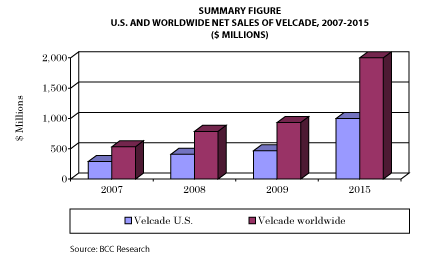September 09, 2010
Wellesley, Mass. – According to a new technical market research report, UBIQUITIN PROTEASOME DRUGS: CANCER AND NEURODEGENERATIVE DISORDER MARKETS (PHM066A) from BCC Research (www.bccresearch.com), the value of the market for ubiquitin proteasome drugs was an estimated $1.4 billion in 2009, but is expected to increase to $3 billion in 2015, for a 6-year compound annual growth rate (CAGR) of 13.5%.
The value of the only approved drug on the market, Velcade, is projected to increase at a CAGR of 13.5% to $1 billion in the United States in 2015, after being valued at $468 million in the U.S. in 2009.
On the global market, Velcade was valued at $933 million in 2009 and sales are expected to increase at a 6-year CAGR of 13.6% to reach $2 billion in 2015.
One of the most remarkable scientific breakthroughs of the 20th century was the discovery of the ubiquitin proteasome system (UPS), and it has provided a foundation for further important research. The UPS was acknowledged with the Nobel Prize in 2004, yet it remains a challenging field in drug discovery. Although there is only one approved product on the market, Velcade (bortezomib), its success as a major blockbuster drives the industry into more rigorous research and development .
Velcade, Millennium Pharmaceutical’s primary source of revenue (more than 45% of its annual sales), is a therapeutic treatment for patients with multiple myeloma, a type of bone marrow cancer that can damage a patient’s immune system. Although Velcade faced some competition from other drug alternatives such as Revlimid, it still holds 40% of the multiple myeloma market.
More importantly, recent developments in the field of proteasome inhibitors bring new perspective and alternatives that may change the current market. This report presents new venues in this area of drug development as well as new competitors and possibly a new outlook for this area of drug discovery in the next couple of years.
The report identifies two major research trends in UPS: proteasome inhibitors versus ubiquitination reaction components as drug targets. This study describes current products in each area, identifies current market participants and, most importantly, notes the trends that are going to affect further drug development in this area. The report also provides information about less-developed areas of UPS, and gives a list of current companies that have new UPS-related products in development.
This report is intended for business development professionals, entrepreneurs, and other investment groups so that they can fully understand and evaluate a new, less-familiar area of drug discovery and development. It provides companies’ corporate development departments new insight into competitors’ positions and shows new opportunities otherwise overlooked or less known to the public.

Source: BCC Research
Ubiquitin Proteasome Drugs: Cancer and Neurodegenerative Disorder Markets( PHM066A )
Publish Date: Jul 2010
Data and analysis extracted from this press release must be accompanied by a statement identifying BCC Research LLC as the source and publisher. For media inquiries, email press@bccresearch.com or visit www.bccresearch.com/media to request access to our library of market research.